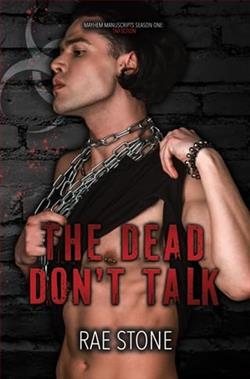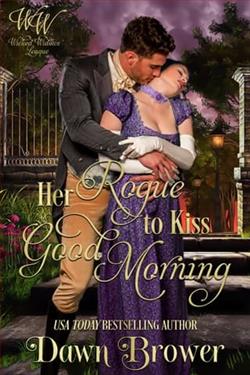Page 274 of The Pillars of the Earth
“But how shall I live?” the man cried.
“If you’re going to stay in the forest you’d better catch birds and fish.”
“I don’t know how!”
“You’re a failure as a robber,” Philip said. “What chance of success did you have, with no weapon, up against three of us, and Richard here armed to the teeth?”
“I was desperate.”
“Well, next time you’re desperate, go to a monastery. There’s always something for a poor man to eat.” Philip got to his feet. The sour taste of hypocrisy was in his mouth. He knew the monasteries could not possibly feed all the outlaws. For most of them there really was no alternative but theft. But his role in life was to counsel virtuous living, not to make excuses for sin.
There was no more he could do for this wretched man. He took the reins of his horse from Richard and climbed into the saddle. He could tell that the bruises from his fall were going to hurt him for days. “Go thy way, and sin no more,” he said, quoting Jesus; then he kicked his horse forward.
“You’re too good, you are,” said Richard as they rode off.
Philip shook his head sadly. “The real trouble is, I’m not good enough.”
On the Sunday before Whitsun, William Hamleigh got married. It was his mother’s idea.
Mother had been nagging him for years to find a wife and father an heir, but he had always put it off. Women bored him and, in a way that he did not understand and really did not want to think about, they made him anxious. He kept telling Mother he would marry soon but he never did anything about it.
In the end she found him a bride.
Her name was Elizabeth. She was the daughter of Harold of Weymouth, a wealthy knight and a strong supporter of Stephen. As Mother explained to William, with a little effort he could have made a better match—could have married the daughter of an earl—but as he was not willing to put his mind to it, Elizabeth would do.
William had seen her at the king’s court in Winchester, and Mother had noticed him staring at her. She had a pretty face, a mass of light brown curls, a big bust and narrow hips—just William’s type.
She was fourteen years old.
When William stared at her, he had been imagining meeting her on a dark night and taking her by force in the back alleys of Winchester: marriage had not crossed his mind. However, Mother swiftly established that the father was agreeable, and the girl herself was an obedient child who would do what she was told. Having reassured William that there would be no repetition of the humiliation Aliena had inflicted on the family, Mother arranged a meeting.
William had been nervous. Last time he had done this, he had been an inexperienced youth of twenty, the son of a knight, meeting an arrogant young lady of the nobility. But now he was a battle-hardened man, thirty-seven years old, and he had been the earl of Shiring for ten years. He was foolish to be nervous about a meeting with a fourteen-year-old girl.
However, she was even more nervous. She was also desperate to please him. She talked excitably about her home and family, her horses and dogs, and her relations and friends. He sat silently, watching her face, imagining what she would look like naked.
Bishop Waleran married them in the chapel at Earlscastle, and there was a big feast that went on for the rest of the day. By custom, everyone of importance in the county had to be invited, and William would have lost face badly if he had not provided a lavish banquet. They roasted three whole oxen and dozens of sheep and pigs in the castle compound, and the guests drank the castle cellars dry of beer, cider and wine. William’s mother presided over the festivities with a look of triumph on her disfigured face. Bishop Waleran found vulgar celebrations somewhat distasteful, and he left when the bride’s uncle began to tell funny stories about newlyweds.
The bride and groom retired to their chamber at nightfall, leaving the guests to continue reveling. William had been at enough weddings to know the ideas that were passing through the minds of the younger guests, so he stationed Walter outside the room and barred the door to prevent interruption.
Elizabeth took off her tunic and her shoes and stood there in her linen shirt. “I don’t know what to do,” she said simply. “You’ll have to show me.”
This was not quite how William had imagined it. He went over to her. She lifted her face, and he kissed her soft lips. Somehow the kiss failed to generate any heat. He said: “Take off your shirt and lie on the bed.”
She pulled the undershirt over her head. She was quite plump. Her large breasts had tiny indented nipples. A light brown fuzz of hair covered the triangle between her legs. Obediently she walked to the bed and lay down on her back.
William kicked off his boots. He sat on the bed beside her and squeezed her breasts. Her skin was soft. This sweet, obliging, smiling girl was nothing like the image that had made his throat go dry, of a woman in the grip of passion, moaning and sweating beneath him, and he felt cheated.
He put his hand between her thighs and she parted her legs immediately. He pushed his finger inside her. She gasped, hurt; then quickly said: “It’s all right, I don’t mind.”
He wondered briefly whether he was going about this in completely the wrong way. He had a momentary vision of a different scene in which the two of them lay side by side, touching and talking and getting to know one another gradually. However, desire had at last stirred inside him when she gasped in pain, and he brushed his doubts aside and fingered her more roughly. He watched her face as she struggled to bear the pain silently.
He got on the bed and knelt between her legs. He was not fully aroused. He rubbed himself to make his organ stiffer, but it had little effect. It was her damned smile that was making him impotent, he was sure. He pushed two fingers inside her, and she gave a little cry of pain. That was better. Then the silly bitch started smiling again. He realized he would have to wipe the smile off her face. He slapped her hard. She cried out, and her lip bled. This was more like it.
He hit her again.
She started to cry.
After that it was all right.















